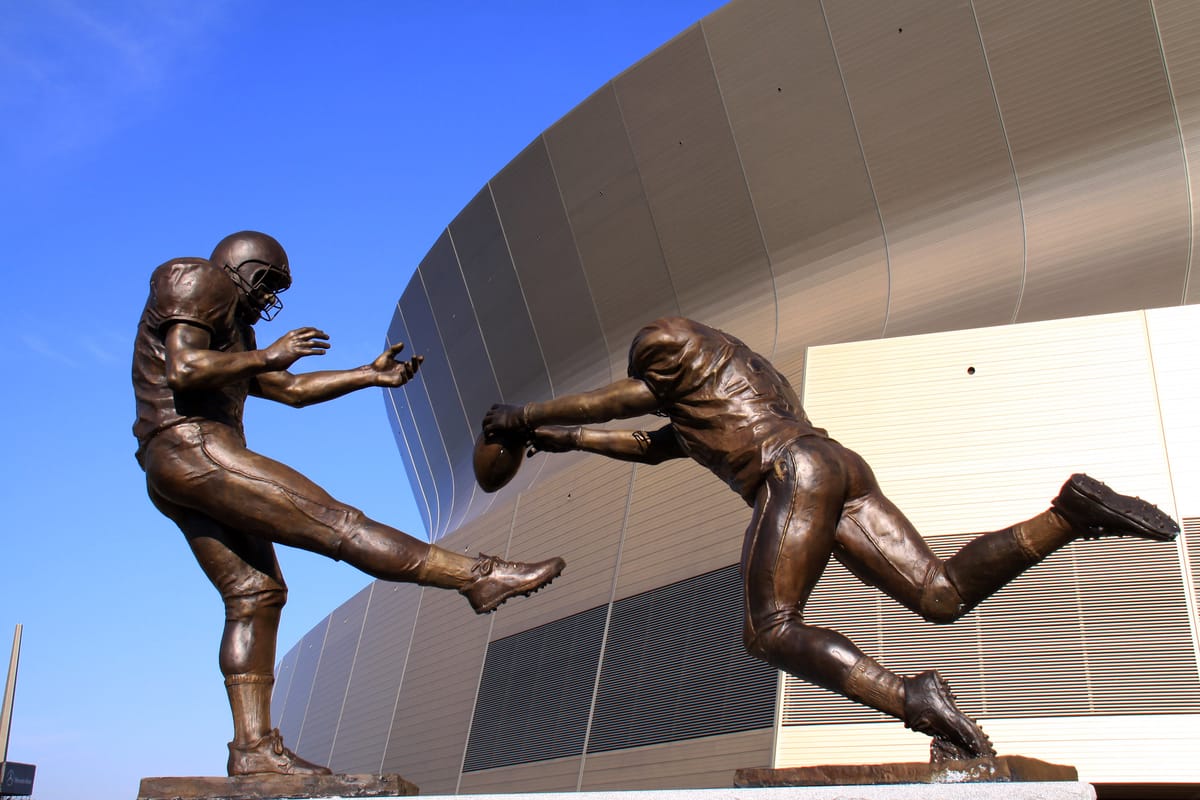The Super Bowl Stinks

On the eve of the Super Bowl I am exhausted by football.
This season has been the first in a long time during which I’ve watched games consistently, week after week. When I was much younger, Monday Night Football was a ritualized treat: my father, my grandfather and I huddled around the—in retrospect, comically small—television in my grandparents’ bedroom. It didn’t matter who was playing, though it was extra special if the Packers (my team) or the 49ers (my grandfather’s) were on.
Since then I’ve watched football enthusiastically but sporadically: with boyfriends who hated Brett Favre and best friends who could not identify Peyton Manning; I’ve watched football in bars and in living rooms and on computers during Thanksgiving. It wasn’t until I felt obligated to watch every weekend, for an entire season, that I stopped to examine what my fandom meant, that I thought to weigh the memory of being eight years old and unthinkingly happy in front of a football game against what actually happens to the people playing. And the weighing has tired me out, just when I should be getting excited for a Super Bowl that literally pits brother against brother.
Still, I could have powered through one more week, my love for football battered but sound, were it not for the AFC Conference game.
It was a strange game, not at all what anyone expected. There was Tom Brady awkwardly scrambling, slinging the ball away on fourth and short instead of running for a first down, a defender looming (close enough so that it’s clear Brady was throwing the ball away because he was scared; not close enough for that to be anything other than deeply shameful); there was Brady again, sliding feet-first, kicking Ed Reed in the thigh—a move I maintain was less malice and more fear-spasm, and which, intentions aside, earned the quarterback a $10,000 fine.
And then, all of a sudden, there was Stevan Ridley, the Patriot’s rookie running back, lying on the ground. A helmet-to-helmet hit by strong safety Bernard Pollard had left him unconscious and, it seemed, twitching slightly.
Four days later, the family of Junior Seau—who in 2012, at the age of 43, took his own life by shooting himself in the chest; Seau’s family subsequently sent his brain to the National Institutes of Health for study, and earlier this month, neuroscientists confirmed that he was suffering from chronic traumatic encephalopathy (CTE) at the time of his death—sued the NFL and the helmet manufacturer Riddell in connection with his suicide.
Recently, there’s been a certain amount of excitement surrounding the revelation that a Notre Dame linebacker’s girlfriend existed only on the Internet and in the mind of the disturbed young man who successfully duped an apparently gullible football player. There has been, in the wake of that revelation, a certain amount of healthy questioning of sports journalism as an industry, and how confirmation bias functions within it.
I’m not a sports journalist, but it took the Manti Te’o scandal and the hit on Ridley and Robert Griffin III’s knee and maybe even terrified Tom Brady high-kicking for me to realize that I have been trying to confirm a bias this entire season, searching for narratives that twist or spike or flatline instead of depress. Narratives that I would be comfortable explaining to eight-year-old me. But this is the only narrative I keep coming up with: Football hurts the people who play it.
It’s not just CTE. It’s torn ACLs and the lie of the “scholar-athlete” and the weakness of the players’ union and the laughable length of the average NFL career (just over three years). It’s that I’m no longer convinced football can be played safely at all, ever. Of course there is choice involved; I am not denying agency. But I do wonder when the choice is made; I do wonder who makes it.
Still, I haven’t quit the sport quite yet. I will watch the Super Bowl this Sunday, if only because, in a twist that strains credulity, the head coaches of the Ravens and 49ers are actually brothers: John and Jim Harbaugh, born 15 months apart to parents Jack and Jackie.
I’ll root for the 49ers; I also think they’ll win. They’ve already come back from a 17-point deficit—an NFC Championship record. With surprise double-threat Colin Kaepernick at QB, I don’t doubt that they’re capable of beating the Ravens and their bizarre narrative momentum.
I don’t yet know if the off-season will refresh me or the reverse. I do know I’m looking forward to it. I’m looking forward to watching this gif of Jim Harbaugh reacting to his challenge being overruled in the conference game, over and over. (If I get tired of that, there’s always his guest appearance on Saved by the Bell in 1996, as well as whatever antics he gets up to on Sunday.) And I’ll be trying desperately to interest myself in baseball.
